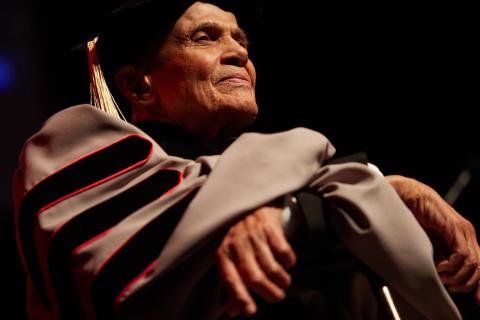Harry Belafonte Accepts Award, Reflects on Music Today

Harry Belafonte
Photo by Kelly Davidson
Harry Belafonte remembers the moment that he decided to pursue the arts as a way of promoting greater social and humanitarian good. It was in the early days of his career and a man named Paul Robeson had come to see Belafonte and others in a Harlem theater play. After the performance, Robeson told them that "artists are the gatekeepers of truth and art is the radical voice of civilization,” Belafonte remembers.
“That rather daunting point of view … kind of set my sights on a way of life that has been very, very rewarding,” the 87-year-old musician, actor, and humanitarian said on a visit to Berklee to receive an honorary doctorate for his extensive contributions to the arts and culture.
Belafonte’s career began in New York, after he returned from fighting in World War II as a Navy serviceman. He started out in the Harlem theater scene and soon pursued jazz and Jamaican folk music. His Caribbean-flavored album Calypso became the first to sell more than 1 million LPs.
In the 1950s and '60s, Belafonte worked with Martin Luther King Jr. to advance civil rights in the U.S., and later expanded his focus to South Africa, working to stop apartheid and to end the incarceration of Nelson Mandela. At the same time, Belafonte continued his work as an actor and a musician.
It was in recognition of these lifelong accomplishments that Berklee presented Belafonte the honorary degree this month. Before a tribute concert in his honor, Belafonte sat down to talk about the award, music, and the importance of the arts. Below is an edited account of his comments.
On his greatest achievements
"I think (it was) serving Dr. King. When he first walked into my life, I had certainly viewed the world in a very different way. And he brought thoughts and ideas to the table that made me see that there was a lot to work with and a lot that could be done, especially through his vision."
On the social consciousness of music today
"I think music can be used for social good, I do not see that it is. There used to be an abundance of great musicians and writers that were committed to the human spirit and social change. But, like the rest of the country, we have become so enamored with goods and money, and our deeper commitment to greed, I think, has destroyed so much that we were and many things that we aspired to be."
"I look at a lot of the music today, and as much as I find hip-hop very interesting, I think that it has done a lot to betray social growth and social development. The way in which women were demonized in the lyrics in the songs that were put out. The debased sexuality that has emerged that gives us a sense that women are inferior, or second-class, citizens, I don’t think is a joyous place to be."
"Although hip-hip was rooted into the music that preceded it, and the culture that preceded it, it took its moment and went into this vast distortion."
On one change he’d like to see
"I would get rid of the sponsors. I’d get rid of commercial underwriting. I think our attention to being paid for our services has destroyed our creative capacity because we play what the merchants want, and we do not play what challenges us as artists. And I think that is a terrible experience."
"The minute we lost subsidy to the arts, the minute the schools shut down the humanities, the minute everybody’s looking at the 60-second bite, the 30-second bite, 10-second bite, and everything is forced into that space, then I think we’ve missed the boat."
On receiving the honorary doctorate
"I’m flattered, and I’m pleased. My mother would have been particularly touched by the ritual of getting a degree from an institution of higher learning, because I was a high school dropout."
“I thank Berklee College. As a matter of fact, in a way I feel like you owe me. I don’t say that arrogantly. I say that because … many of the artists that played with me quit. And when some of them quit, I thought when they quit that they were going off to a better band and to bigger pay. But that was not the case. They told me they were coming to Berklee.”
